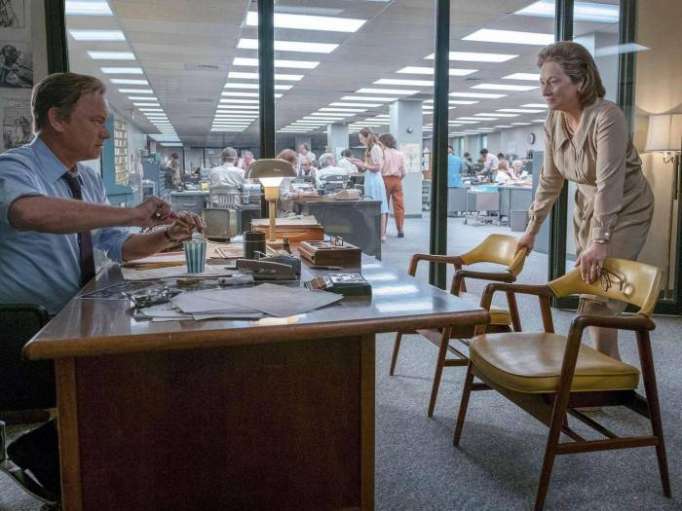He was right. There was a moment when nostalgia got the better of me, as Hanks, playing Ben Bradlee, editor of The Washington Post, got the go-ahead from Streep as Katharine Graham, the publisher, to print top secret US government papers.
But while I could identify with the characters, the risks they were facing in being taken go court and ending up in jail, and the sheer excitement of what they were doing, the piece felt quaint, lost in a bygone age.
The issues and the thirst for news still exist – as does, the White House’s disdain for investigative journalism and quest for control. However, the accompanying process seemed almost medieval. At one point the whole chain, from reporter’s notepad to printing plant to finished product, dropped from the backs of lorries outside newsstands, was laid bare. It looked like a museum piece, destined to be consumed by digital.
Something identical is occurring in our high streets. But in terms of job losses and the holes left in our communities, the ramifications are much worse. Newspapers, by and large, were not huge employers, and in many cases, their content and editorial jobs have transferred to the web.
The same is not the case in retail. Our main shopping thoroughfares are in turmoil – and precious little is urgently being done about it.
Consider a spate of news stories in the past few weeks alone. First, that in November and December, one in four non-food purchases in the UK were made online.
Then, in no particular order: Debenhams is to close 10 out of its 176 branches; Marks & Spencer is losing 14 from its 302 clothing, food and home stores; House of Fraser is to cut its estate by one-third; New Look is planning to shed 60 of its nearly-600 outlets; Toys R Us is shutting 26.
This is without the ongoing softly-softly disposals by the banks. Another branch has vanished from where I live – where once all the main UK retail banks had branches along the main street, now there are none.
Meanwhile, some restaurant chains are also cutting back on their sites, suffering from a triple whammy of over-supply, high business rates and the minimum wage. That, of course, is before we even start to consider the impact of the innovation that now sees firms like Deliveroo take orders online, and deliver restaurant standard meals to our door.
Our high streets, the very hearts of our towns and cities, are in crisis. The closures made so far are just tinkering at the edges. Expect many, many more in the next few years.
The disappearance of well-known stores is the most worrying of all. What is unfolding is a generational revolution, akin to that experienced by grocers, butchers and other independents when self-service supermarkets began to make their presence felt in the 1950s.
The best-known are often magnets, drawing in shoppers, who then buy other items nearby. They can be iconic, anchored in the High Street for decades. An M&S closure is not any other closure, it’s an M&S closure – with plenty of symbolism and emotion attached.
If we’re not careful our town and city centres will become doughnuts, devoid of people and commercial activity, empty of employment and no longer providing wealth. The inactivity is worrying – the shift is happening now, before our eyes, and that’s all we’re doing, watching.
Business rates is a major bugbear. In some parts of the country, property rentals are now lower than the business rate. That is an absurdity.
At present, the see-saw is tilting one way, in favour of the internet retailers. If we want to save our shops we must begin to correct the balance. Bricks and mortar sellers pay business rates; online do not. We can’t abolish business rates completely – the revenue they created is much-needed and is spent locally by councils. Apart from changing how they’re calculated, why not move quickly to charge an online tax to the digital retailers so that a semblance of equality is created?
Upward-only rental reviews must be scrapped. Landlords need to be more adaptable and realistic.
These are measures that have to be taken. But if we want to keep our high streets, maintain the community role they fulfil, we’re obliged to do much more.
The internet is not going anywhere. Soon, that 1 in 4 figure for non-food sales conducted online will become 1 in 3, and head for 1 in 2.
There’s no quick fix, no magic bullet. But neither can we stand still and do nothing. At the same time, we have to do more than the solution offered to date, of inviting Mary Portas to sprinkle her magic dust over the land. This is a far bigger task than the one that inspired her, of improving Marylebone High Street.
A government-backed task force is what is required, to launch an immediate examination and to report back, with recommendations that are approved, by councils, planners and all authorities alike.
We have no choice. As I know too well, from my days in newspapers, when at first we thought the internet was a temporary aberration, and normality as we knew it would return. It hasn’t, as The Post so vividly reminds us.
The Independent
More about: ThePost
















































